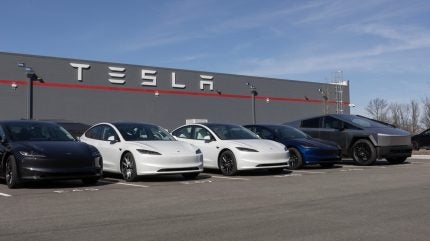
Tesla has been ordered to pay $243m in a landmark lawsuit concerning a fatal crash involving its Autopilot system in Florida, US, in 2019.
A federal jury in Miami attributed 33% of the responsibility for the collision to Tesla after a Model S failed to stop at a sign and collided with a Chevrolet Tahoe.

Discover B2B Marketing That Performs
Combine business intelligence and editorial excellence to reach engaged professionals across 36 leading media platforms.
The jury deliberated for less than a day after a three-week trial before reaching its verdict.
They assigned the majority of the blame to the Tesla Model S driver but also ruled that Tesla should compensate the victims with $42.5m for their losses and pay an additional $200m in punitive damages.
Tesla anticipates that the punitive damages awarded will be minimised by the court.
Tesla argued: “the driver, George McGee, was entirely at fault because he was distracted when he dropped his mobile phone on the floorboard.”
The company’s statement was quoted by Bloomberg as saying: “Today’s verdict is wrong and only works to set back automotive safety and jeopardise Tesla’s and the entire industry’s efforts to develop and implement life-saving technology.
“We plan to appeal given the substantial errors of law and irregularities at trial.”
The outcome of the Miami lawsuit is said to tarnish the company’s near-immaculate court record. The company had won two Autopilot-related crash trials in California, US, and settled several other cases confidentially.
The verdict arrives amid heightened investor scrutiny of the EV maker’s CEO, Elon Musk, following a tumultuous period for the company’s stock.
During the trial, jurors heard from the Model S driver, relatives of the deceased, Tesla engineers, and external experts about the role of Autopilot in the crash.
The driver had activated the driver-assistance system while driving home and had overridden the vehicle’s adaptive cruise control by accelerating beyond the speed limit moments before the crash.
McGee testified about being distracted by his phone and expecting Autopilot to assist him. The family of the deceased, Naibel Benavides Leon, had previously reached a confidential settlement with McGee in 2021.
The plaintiffs’ lawyers argued that Tesla’s Autopilot promotes a false sense of security and that the company, along with Musk, has exaggerated the system’s capabilities. They also claimed that Tesla neglected to implement safeguards to restrict the software’s use to appropriate roadways and to monitor driver attentiveness.
Tesla’s defence emphasised driver error as the cause of the collision, pointing to McGee’s history of aggressive driving and his failure to remain attentive despite warnings in the owner’s manual. The company insisted that there were no defects in the software and that Autopilot functioned as intended.
The company’s defence attorney, Joel Smith, argued that no driver-assistance technology available in 2019 could have prevented the crash.
The automotive industry classifies vehicle automation systems from Level 0 to 5, with Tesla’s Autopilot rated at Level 2, indicating that it needs constant driver input and supervision.
Tesla recently reported a 12% year-on-year decrease in total revenue for the second quarter (Q2) of 2025, with figures falling to $22.49bn from $25.5bn in the same period last year.






